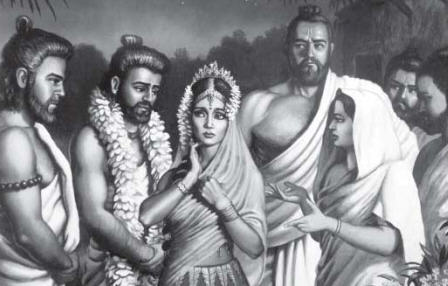
In a recent book Draupadi, written by Dr. Yarlagadda Lakshmi Prasad, the character of Draupadi is denigrated. According to him a true sati should have only one husband. To clarify above I refer to verse 155 of Chapter 19 of Mahabharata tatparya nirnaya, written by Srila Madhvacarya.
When Drupada, the father of Draupadi, was disagreeing to give his daughter to the five brothers, Srila Vyasadeva said, “The wives of the five Indras Syamala Devi, wife of Yama (represented by Yudhisthira); Bharati, wife of Vayu (represented by Bhimasena); Sachi, wife of Purandara (represented by Arjuna); and Usha, wife of both Nastyam (represented by Nakula) and Tasram (represented by Sahadeva) are present in Draupadi in their aàSa avataras. Therefore giving her in marriage to their respective husbands is not an irreligious act.
There can be another doubt: If Nakula and Sahadeva are two, then how can they marry one Usha? In their original form, they are Asvini kumaras. The Tatparya nirnaya, chapter 12, verse 124 says, “The devas Asvini kumaras never get separated. Just as nose is one sense organ but has two holes, the Asvini kumaras have only one soul, but two bodies. Therefore, they are presiding deities for nose. Thus having one wife to both of them is quite proper.
Excerpts from Mahabharata, Chapter 11 “The Pan davas Wed Draupadi,” translated by Krisina Dharma Dasa:
Drupada revealed his doubts. He could not see any way by which the five brothers could all become Draupadi’s husband. It would mean that the elder brother would be approaching his junior’s wife. According to scripture, that would be the same as approaching his daughter.
Yudhisthira replied that his heart, which could never turn to sin, felt no misgivings about the proposed marriage. He cited a historical example of a Brahmin girl named Jatila who had married seven rsis at once. There was also the case of the famous ascetics known as the Prachetas. They too, being brothers, had accepted one woman as their shared wife. These examples were found in the Vedas and were not considered sinful. In certain circumstances even established rules may be broken in
order to preserve a higher religious principle.
Kunti agreed with her son and asked the sage how she could be saved from untruth. Vyasadeva replied, “O gentle lady, you shall certainly be saved from sin. This is eternal virtue.”
The sage turned to Drupada and said, “I wish to speak with you in confidence, O King.” When they were alone Vyasadeva explained to the king why the marriage conformed with virtue. The ascetic told Drupada that Draupadi had been the daughter of a rNi in a previous life. She had prayed to Shiva for a husband. In her prayer she asked the deity five times for a powerful husband. Shiva had replied, “Since you have asked me five times, in your next birth you shall have five husbands.” Shiva could not possibly ordain a sinful act.
Vyasadeva further explained that the princess was an expansion of the Goddess Laksmi. She had appeared from the sacrificial fire in order to become the Pan davas’ wife, who themselves had all been gods in their past lives. In fact, the sage explained, all the brothers had been incarnations of Indra in different millenniums.
Vyasadeva bestowed upon the king the divine sight to see the Pan davas as they had been in previous lives. In his inner vision Drupada saw the blazing form of Indra that each brother had possessed their celestial bodies adorned with golden crowns and garlands.
Struck with wonder, Drupada folded his palms and said to the sage, “O great Rishi, there is nothing outside your knowledge or capabilities. My mind is now satisfied. What has been ordained by the celestials must always come to pass. We are all instruments in the hands of destiny. Let my daughter accept all five brothers as her husbands.”
